From the Field Transforming Diets and Livelihoods through Kitchen Gardening in Busia County, Kenya
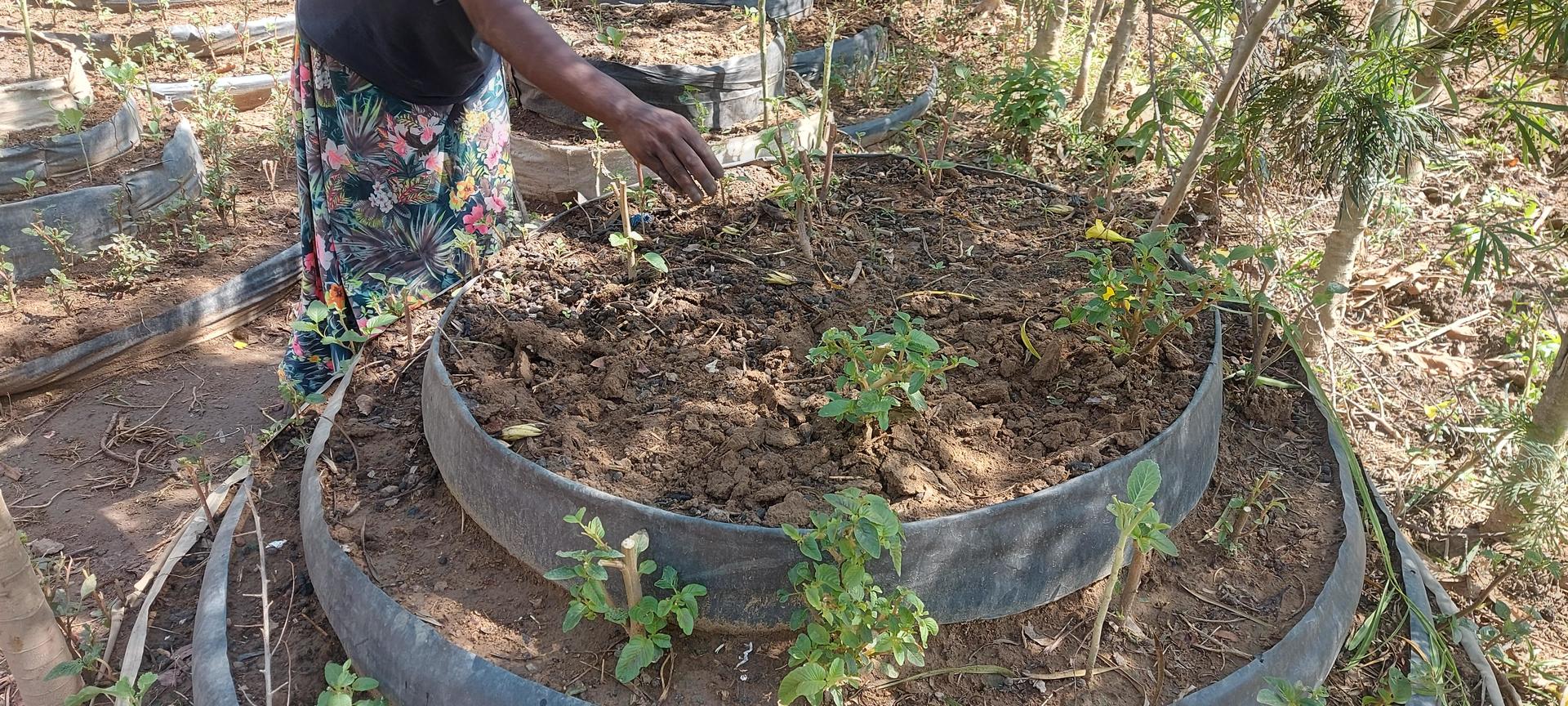
Feedback from community members who participated in the project implementation of community action plans for improved diets and livelihoods is evident that empowering communities to become agents of change/citizen scientists rather than passive recipients of aid and/or knowledge is key to sustainably improving diets and livelihoods. The participants from the project site in Busia County were interviewed during the endline survey following a 1-year intervention implementation phase.
Small scale farming is positively impacting millions of households in Eastern and Southern Africa (ESA) while contributing to the recovery and resilience of local food systems, providing access to affordable, safe and nutritious foods. The Alliance through the project: Improving dietary quality and livelihoods using farm and wild biodiversity through an integrated community-based approach in Kenya, has worked with farmers in Vihiga, Turkana and Busia counties to help them handle and mitigate the adverse effects of climate change.
The project piloted an integrated community-based approach where communities, extension workers (NGO and government) and researchers co-learned about diet quality, nutrition, and health, and subsequently proposed and selected appropriate interventions to improve diet quality through better use of seasonally available agrobiodiversity. The project goal is to empower communities to make better use of the potential of seasonally available biodiverse nutritious foods to contribute to improved farm resilience, food and nutrition security and incomes.
Meet project participants
As one of the community intervention initiatives, the members formed and registered 10 self-help groups. Sauti Moja self-help group is a community group in Okisimo village, Teso South subcounty, Busia County. The group has 36 participants. One of the group’s members is Mr. Anthony Ouma, a 56-year-old community health volunteer (CHV). The groups have been trained on regenerative farming practices which Mr. Ouma has implemented on his farm. In addition to personal practice, he has also trained members of his village in the same farming techniques in addition to providing information on healthy diets and nutrition. Mr. Ouma says the main challenge in uptake of the techniques is lack of funds to purchase the materials needed to put up the sacks. He says,
“people are really interested in the new techniques, but they lack the money to buy the required materials to put up the sacks, for example. you can train someone tell them where to buy the materials but when you go back the following day to help them in setting up, they tell you they did not get the money to purchase the required materials. So, most people have put up the traditional kitchen garden with different varieties of vegetables like sukuma wiki, sucha, pumpkin and amaranthus.”
Despite the challenges, Mr. Ouma is happy that members of his village have taken up kitchen gardening and diversified the types of vegetables grown.
As a small-scale farmer, Mr. Ouma no longer buys vegetables and he also earns from his small farm, and is able to make around 2 dollars weekly from his farm.
Ms. Jane Nabwire, Mr. Ouma’s wife, echoes his sentiments as she can now attest to improved livelihood and diet diversification since she started sweet potato farming which earns her an approximate of 5 dollars weekly. In addition, Ms. Nabwire earns a living from her farm through selling cowpeas, slender leaf, and black night shade seeds to her neighbours. According to her, it has been a very happy time even in the family because she is now empowered with agricultural knowledge and skills which she applies on her farm and is reaping the benefits from. From the group activities she also received training on sweet potato production and different ways of its preparation to make it palatable. Jane is excited about the sweet potato farming technique. She says:
“sweet potatoes were not doing well in my farm. I always lost produce to rodents and thieves due to poor planting skills. After getting new skills from the project, my potatoes were out of reach. If you came to my farm you could not know if you can get any potatoes. In fact, if anyone else went to harvest they could not get. But for me, with the new skills I dig out and get very big potatoes. I harvested a lot which I prepared for my family in different forms including chips, which we were trained in the cooking demonstrations. I also sold some and gifted my neighbours too. In total the yield would earn me around 5 dollars”.
She further says:
“since I got involved in this project, I have never bought vegetables. The only ‘vegetables’ I buy are omena and meat. The leafy ones I get from my kitchen garden”.
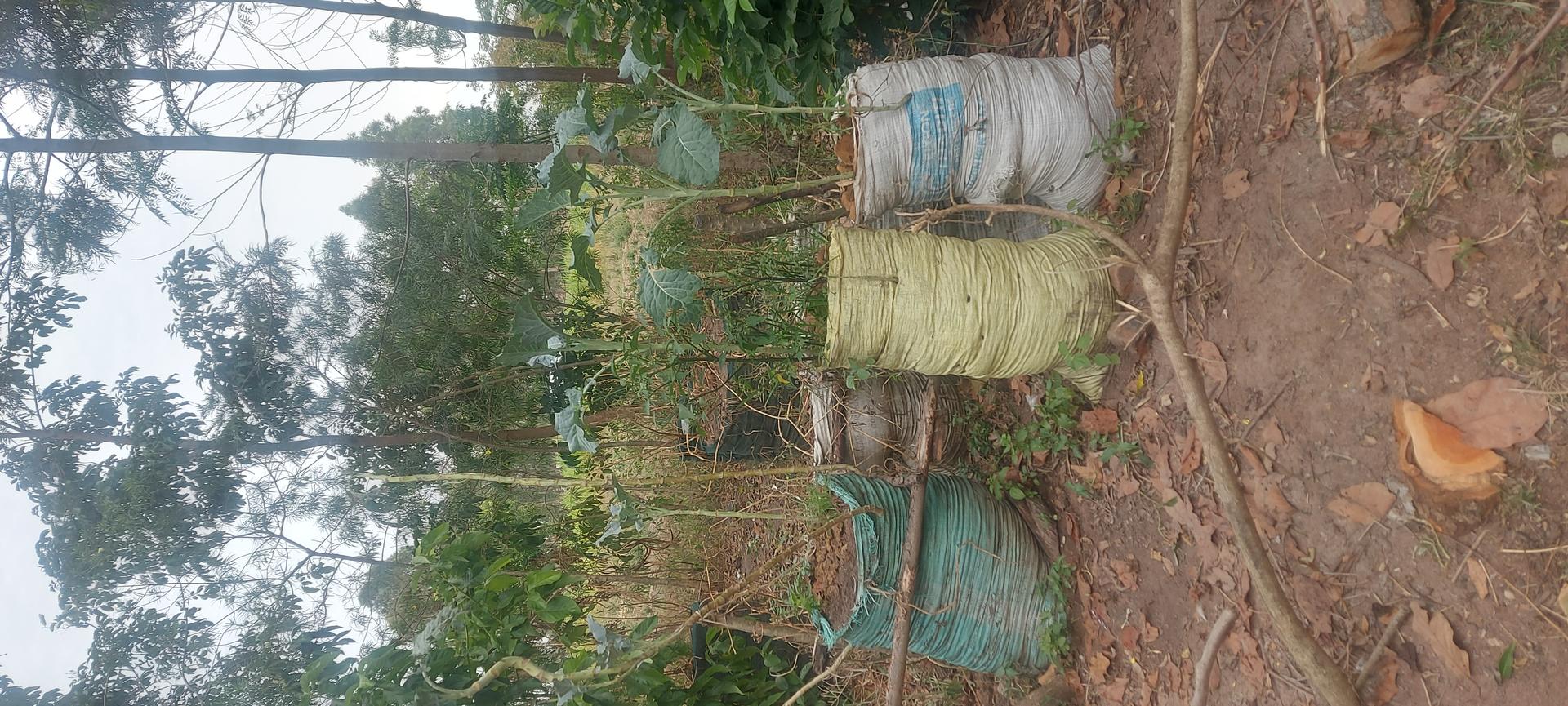
Antony and his wife Jane at their sack gardens. Credit: Irene Mudiovo Induli / Alliance of Bioversity International & CIAT
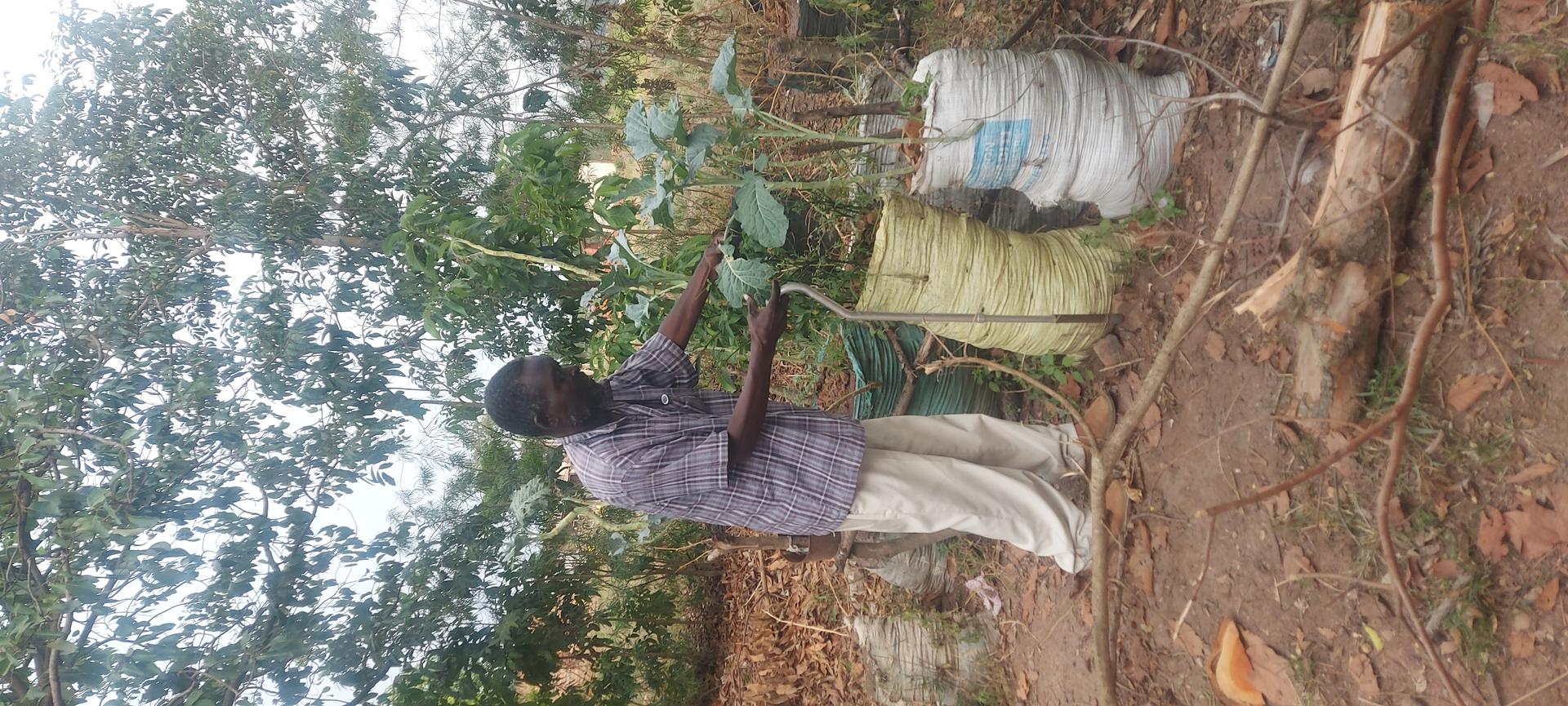

The circus variety of sukuma wiki is more resilient than the seeds sold in agrovet shops, especially during the dry season. The couple says the circus withstood the harsh weather while the seeds dried out. The main challenge faced is attack from pests and diseases which have affected the yield. Despite living with disability, Mr. Ouma has risen above the shortcoming and is working towards making his family’s and community’s lives better through the voluntary health work. In addition to being a community health volunteer and a member of Sauti Moja Self Help Group, Mr. Ouma is the chairman of Okisimo Disability Association, where he has taken the knowledge gained through the group activities and encouraged the association members to engage in farming and other food and income generating activities. He encourages families with people living with disability to support them in farming activities because most of the disabled people cannot actively engage in farming.
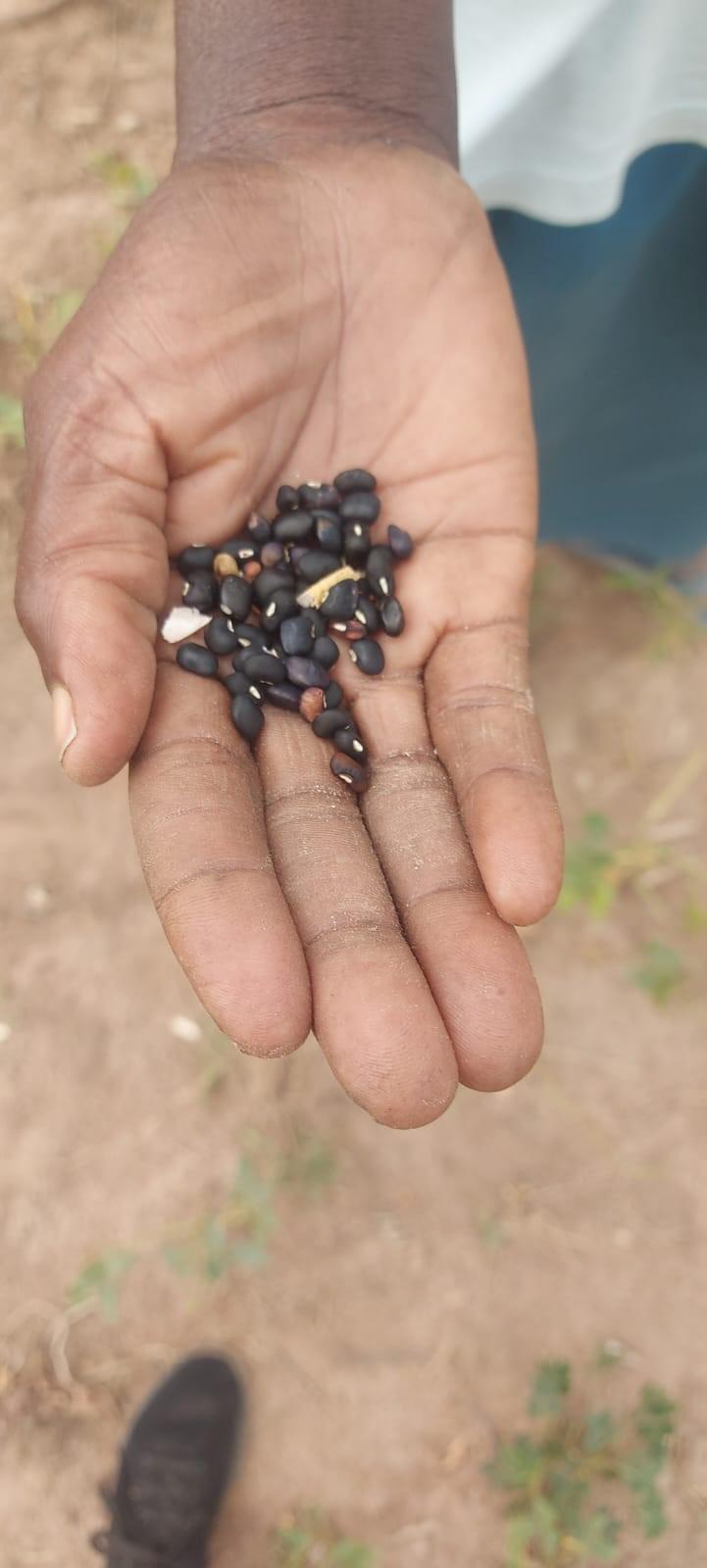
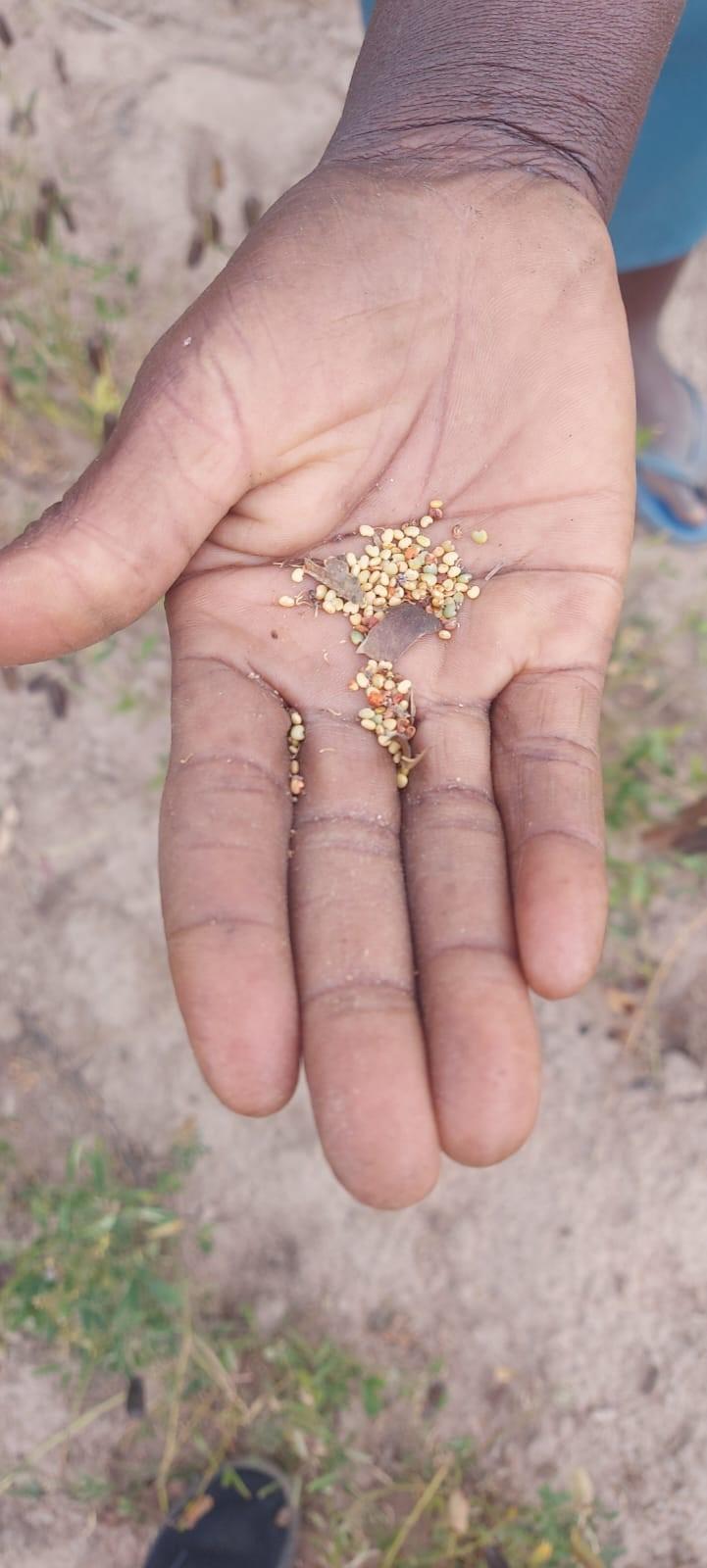
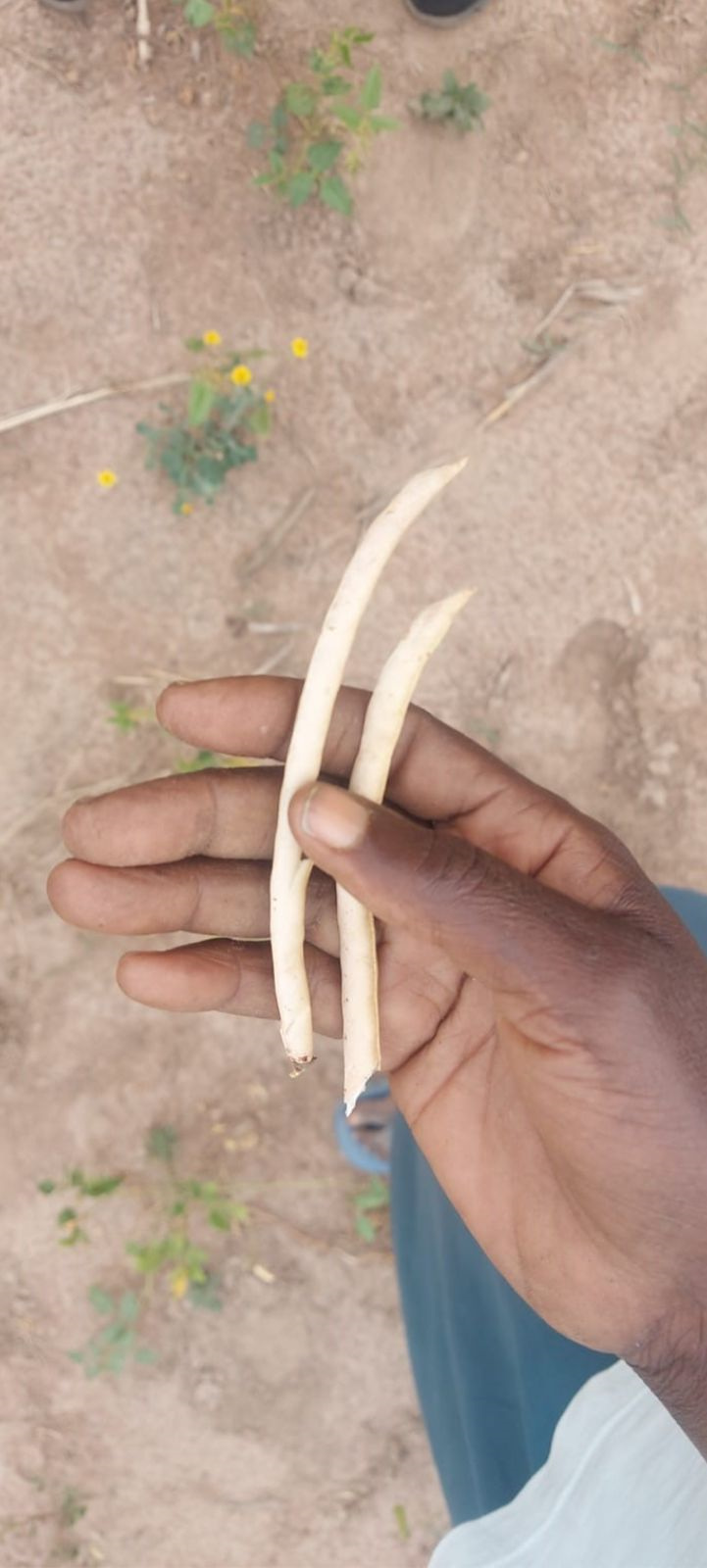
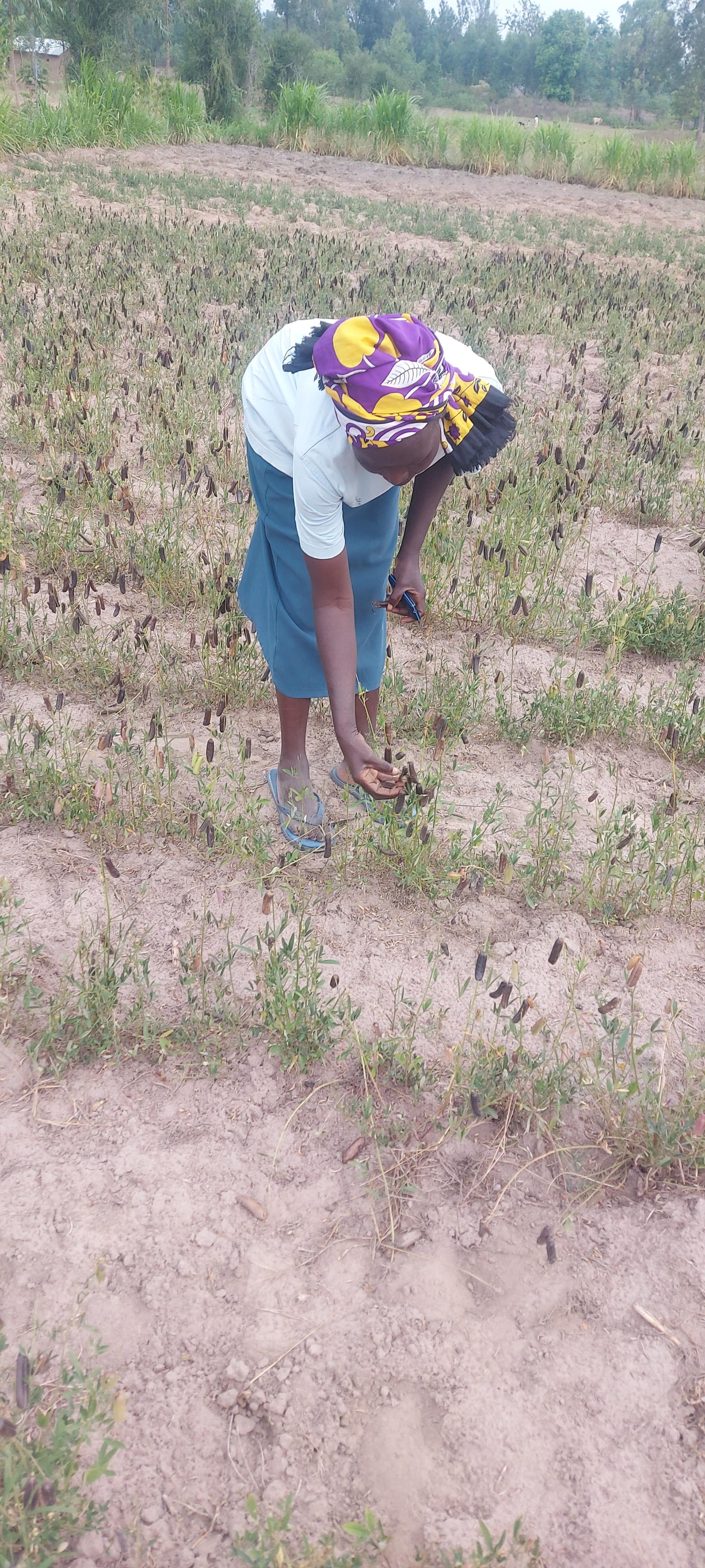
Cowpea and slender leaf (mitoo) seeds at Jane Nabwire’s farm. Credit: Irene Mudiovo Induli / Alliance of Bioversity International & CIAT
We cross the county to Akiriamas community unit where we meet Ms. Maimuna Musika, a 58-year-old widow who is also taking care of her six grandchildren in Machakus village. She is a member of the Akiriamas self-help group, which she joined from the inception of the project during intervention co creation.
“Getting vegetables has been both expensive and challenging in the preceding 4 or so months, but for me I always had enough to feed my family, thanks to these gardens that I have put up here in my home”.
Her farm provides her with daily vegetables. She has not bought any vegetables since she was actively involved in the group farming lessons and putting up her 7 storey gardens. This helped her to increase the kitchen garden area and improved the management of vegetable production as production is close to the house. She has also invested in sweet potatoes, which were part of the group’s intervention crops, they came in handy during the dry season.
The group also invested in poultry farming. Due to the high cost of feed, the chickens were distributed to each group member. She received two and added 10 from her own savings. She lost the two from the group to a disease outbreak that had hit her neighborhood.
In a small plot measuring 125m by 50m, Ms. Maimuna is determined to provide food for her family. She has sub divided the small piece and planted a variety of food crops including orange fleshed sweet potatoes, cassava, maize, a variety of vegetables, napier grass for her goat, and some fruit trees. She is excited about the benefits coming from the project. She said:
“nimepata furaha. Hii mradi imeniinua sana, sasa najihisi kama mtu kwa hii jamii”. (I am very happy. This project has made me feel like someone valuable in this community.)
Maimuna’s land. Credit: Irene Mudiovo Induli / Alliance of Bioversity International & CIAT
Maimuna’s storey gardens. Credit: Irene Mudiovo Induli / Alliance of Bioversity International & CIAT
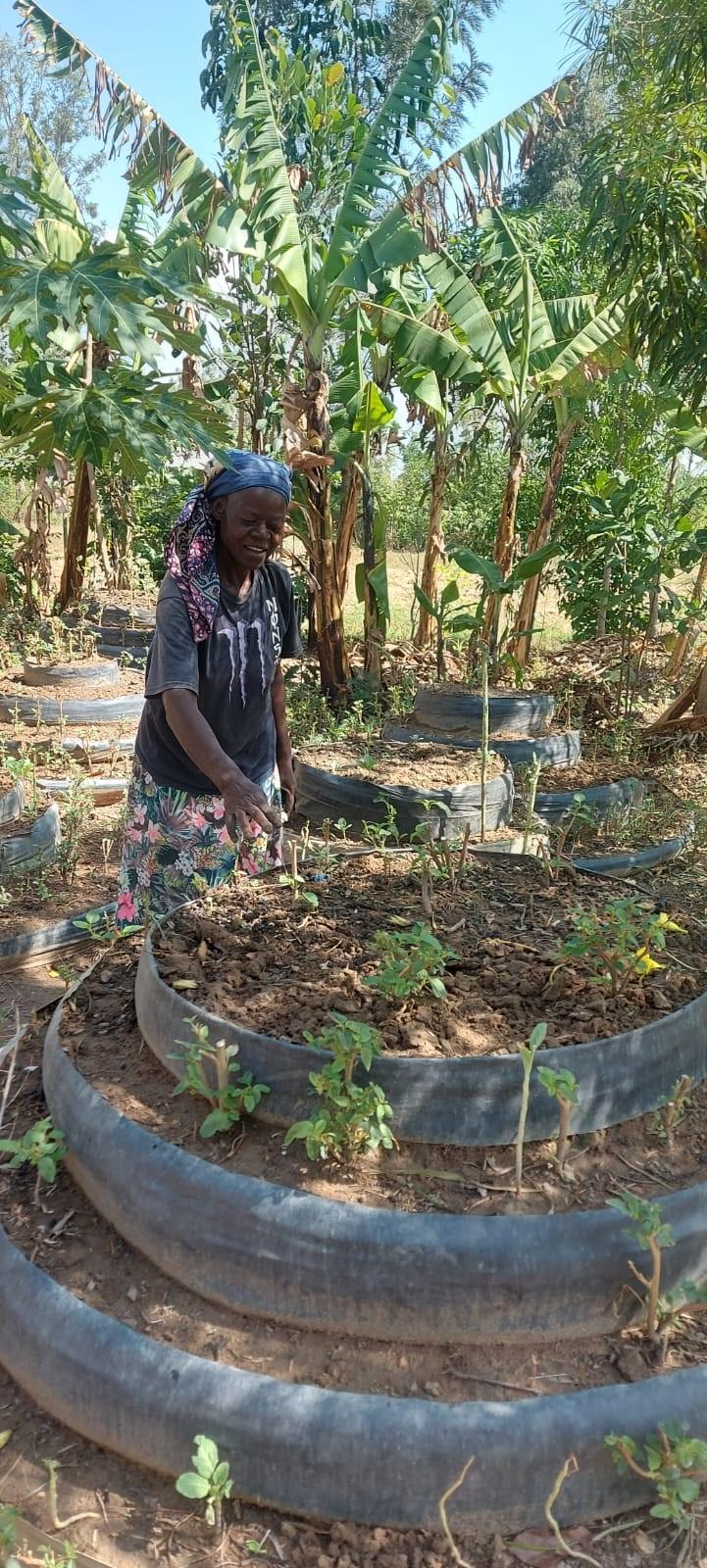
Left to right: Maimuna tending one of her gardens, her potato garden and feeding the chicks. Credit: Irene Mudiovo Induli / Alliance of Bioversity International & CIAT
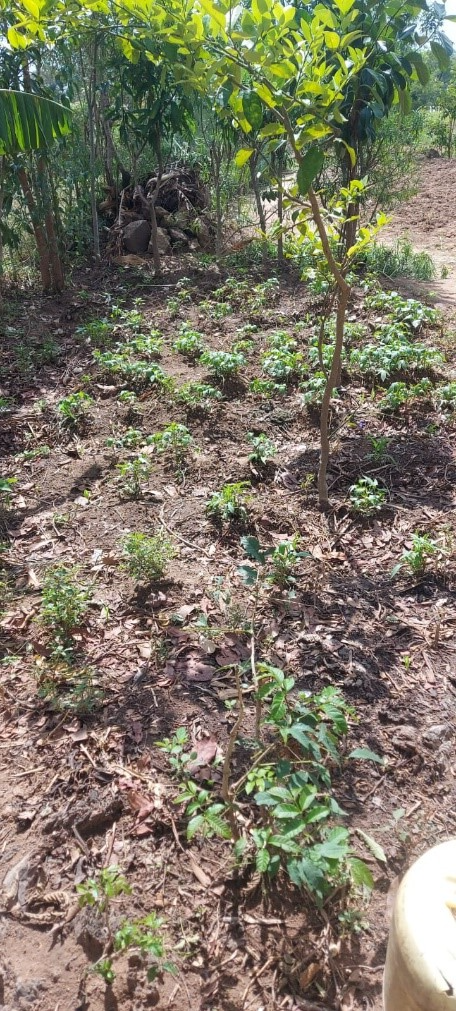
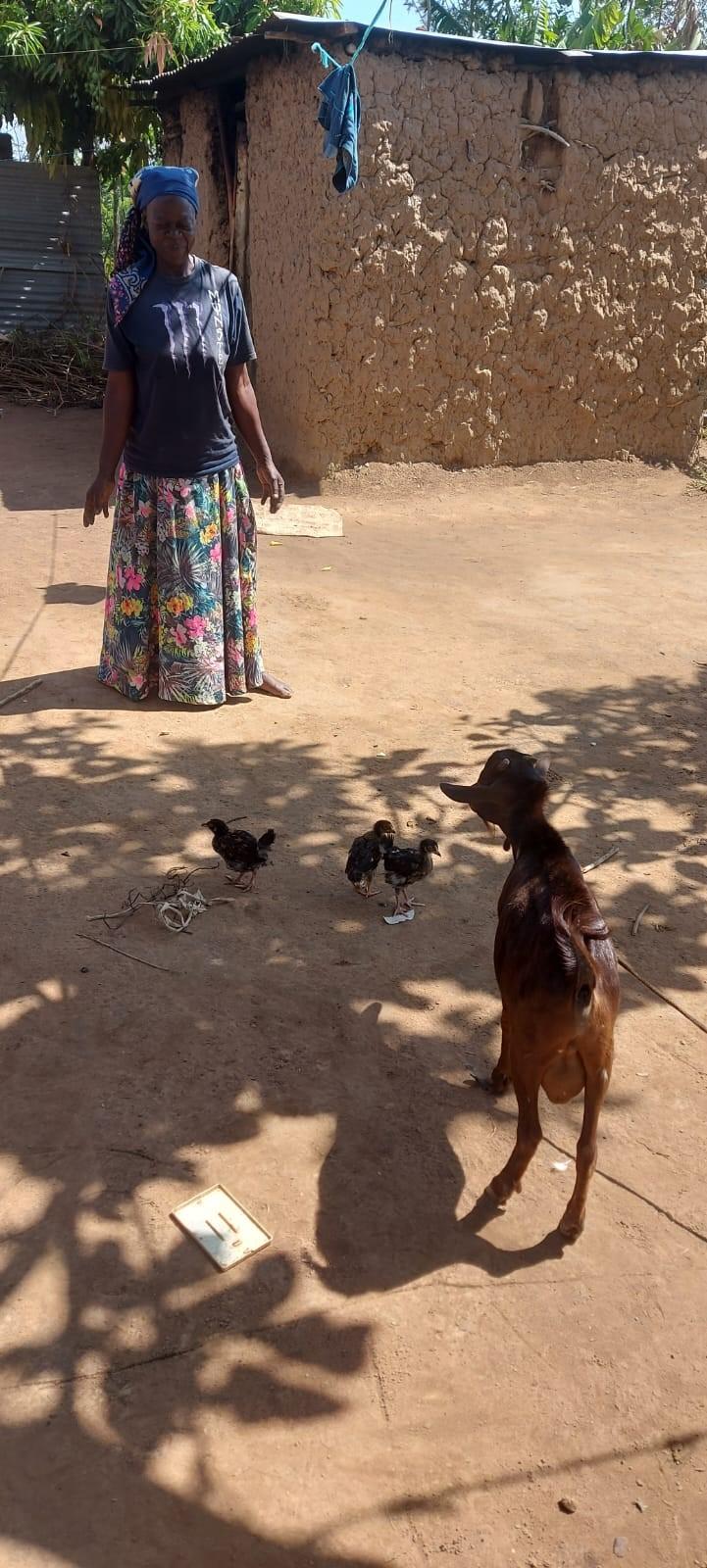
Table banking supported the groups to save money for small individual investments. This concept is simply a group funding strategy where members of a group meet on regular set days, place their savings, loan repayments and other contributions on the table before them. They then proceed to borrow immediately either as long or short-term loans according to their needs. The group activities encourage and motivate the group members to share experiences. Maimuna trains now others interested in learning more about kitchen gardening and helps in putting up the storey gardens at no charge. Meanwhile she has trained her neighbours and put up 4 new gardens together with those who expressed interest in hoisting the gardens.
At the time of the interview the Akiriamas group was scouting for land to expand their vegetable production while being active with its table banking activities.
In her view, the regenerative farming practices are very beneficial despite costing both time and money. She expressed a hunger for more knowledge and skills in the production of various food varieties including fruit trees, which is the wish of all other participating farmers that the project would scale up to include other community members and food varieties.
The drought has been tough, which has been a major challenge for the groups. With no constant supply of water, their farms have been drying up and leading to crop and financial losses. Through the self-help groups, the communities are working together to come up with long lasting solutions that can help during the dry seasons.
The farmers in the groups are being encouraged to diversify their kitchen gardens to diversify and enrichen the agroecology, improve their diets, and incomes.
Meet the Team
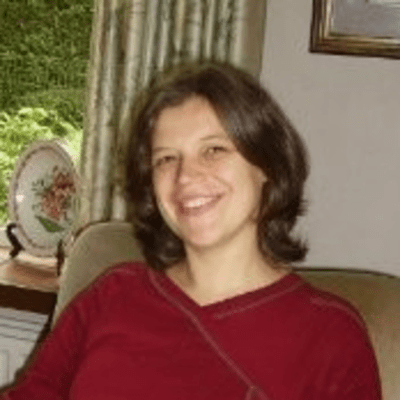
Céline Termote
Senior Scientist - Africa Regional Team leader Food Environment and Consumer Behavior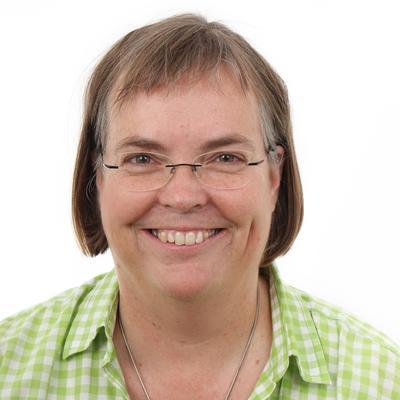
Irmgard Jordan
Human Nutrition and Home Economic Scientist - CIM Expert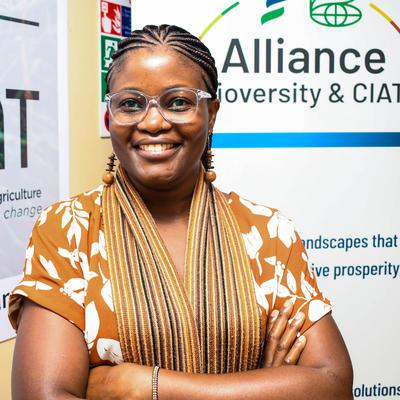
Irene Mudiovo Induli
Research AssociateThe Alliance will continue investing in such projects to enhance agrobiodiversity, empower women through agribusiness, improve household and regional dietary diversity by promoting nature positive home-grown solutions to nutritious, diverse, and safe foods. Together with local stakeholders, community members the nutritional problems are identified, and solutions discussed, a community action plan developed and put into action. More research is required on how best to scale it up, how to process the kitchen garden products to cover the dry seasons and reduce food waste in periods of surplus. How best to improve pest and disease management for organic food production and building up sustainable market linkages, creating short value chains in a participatory way are questions which need further research.
